The sky is no longer the limit for photography enthusiasts and technology hobbyists. Drones have opened up a new realm of possibilities, making the thrill of aerial photography and videography accessible to novices around the globe. However, stepping into this burgeoning pursuit requires the right gear, and it’s here that entry-level drones prove their worth. The best entry-level drones offer an uncomplicated flying experience without sacrificing quality, which is precisely what beginners need to elevate their skills.
Our in-depth top beginner drone reviews focus on user-friendly models that provide the perfect blend of features, performance, and value. We look at drones like the DJI Mini 3, a standout model praised for its portability and easy handling, to less expensive, affordable drones for beginners like the Ryze Tello, which offer a solid introduction to drone flight dynamics. Equipped with insights from our rigorous Entry-Level Drone Reviews for Beginners, you’ll find the perfect aerial companion to start your flight journey.
Whether you’re aspiring to capture stunning landscapes from above or just seeking the joy of flying, choosing the right drone can make all the difference. We take the guesswork out of the equation to help you select the ideal drone that meets your needs and budget, ensuring your introduction to this exciting field is as seamless as your drone’s takeoff.
Entry-Level Drone Reviews for Beginners: Your Ultimate Guide
Welcome to the world of flying drones! If you are a beginner looking for that perfect match to start your aerial journey, look no further. This comprehensive guide will help you navigate through the exciting yet overwhelming market of entry-level drones. Here, you’ll find beginner-friendly drone recommendations, understand critical factors from our beginner drone buying guide, and make sense of the features with an entry-level drone comparison tailored for your needs.
What Makes a Drone Beginner-Friendly?
To qualify as beginner-friendly, drones should exude user-friendly qualities. These qualities include straightforward, non-complex controls and built-in safety features like obstacle avoidance, which are particularly reassuring for those piloting a drone for the first time. The ideal entry-level drone offers a mix of durability, stability in flight, and simple yet effective guidance systems that inspire confidence in new pilots both indoors and outdoors, setting the foundation for a rewarding flying experience.
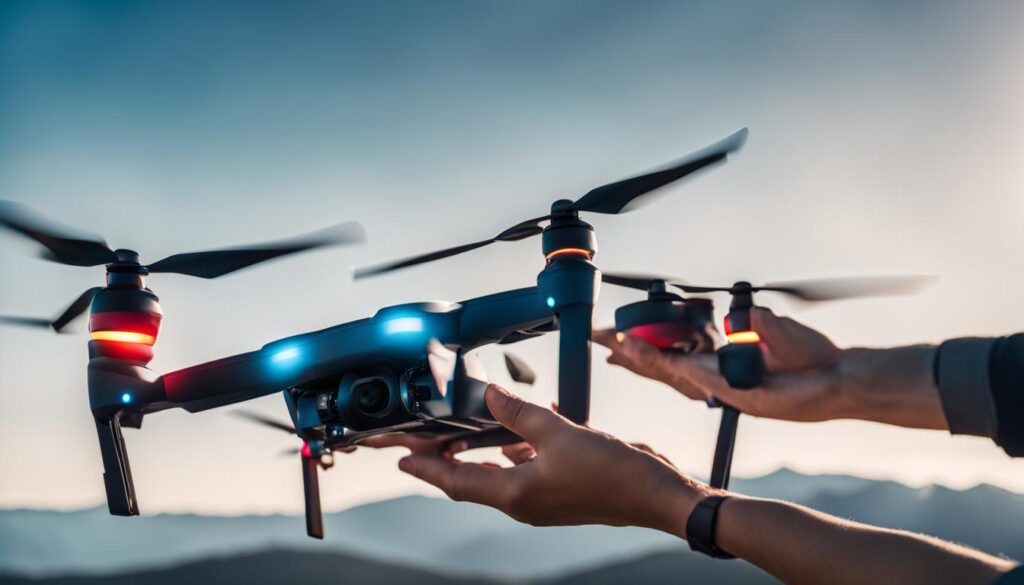
Navigating Your First Purchase: Key Considerations
Embarking on your first drone purchase can be daunting. There are several pivotal factors to scrutinize to secure a drone that perfectly suits your objectives. Battery life plays a significant role in how long you can enjoy uninterrupted flights, while camera resolution dictates the clarity and detail of the images and videos you’ll capture. An unfaltering emphasis on ease of use ensures that beginners can quickly adopt flying as a hobby or skill without the intimidating learning curve.
- **Battery Life:** Aim for drones with longer battery life for extended sessions.
- **Camera Quality:** Look for a decent camera resolution to capture crystal-clear memories.
- **Ease of Use:** Prioritize drones with intuitive interfaces and instructional resources.
The Importance of User-Friendly Controls
Nothing encourages a novice more than drones that are straightforward to pilot. User-friendly controls are a hallmark of beginner drones, with many models featuring responsive inputs and supportive apps. These controls facilitate smoother take-offs and landings and pave the way for mastering basic and slightly advanced maneuvers. By placing an emphasis on ease-of-use in the control department, beginners can fully engage with the flying process, cultivating skills that will serve them for all their future flights.
Remember, the key to a successful foray into drone flying is choosing a device that not only aligns with your beginner status but also grows with you as you advance. With an informed approach, selecting your first drone can be a memorable milestone in your emerging life as a drone enthusiast.
DJI Mini 3: A Compact Powerhouse for New Pilots
Earning its title as the best overall beginner drone, the DJI Mini 3 is an exemplar of modern drone technology tailored for new entrants to aerial photography. Its user-friendly appeal stems from a combination of high-grade functionality and an undemanding learning curve. With an intention to explore this compact marvel, let’s delve into the features and flying experience that make the DJI Mini 3 a staple in the beginner’s drone selection.
Unpacking the Features of DJI Mini 3
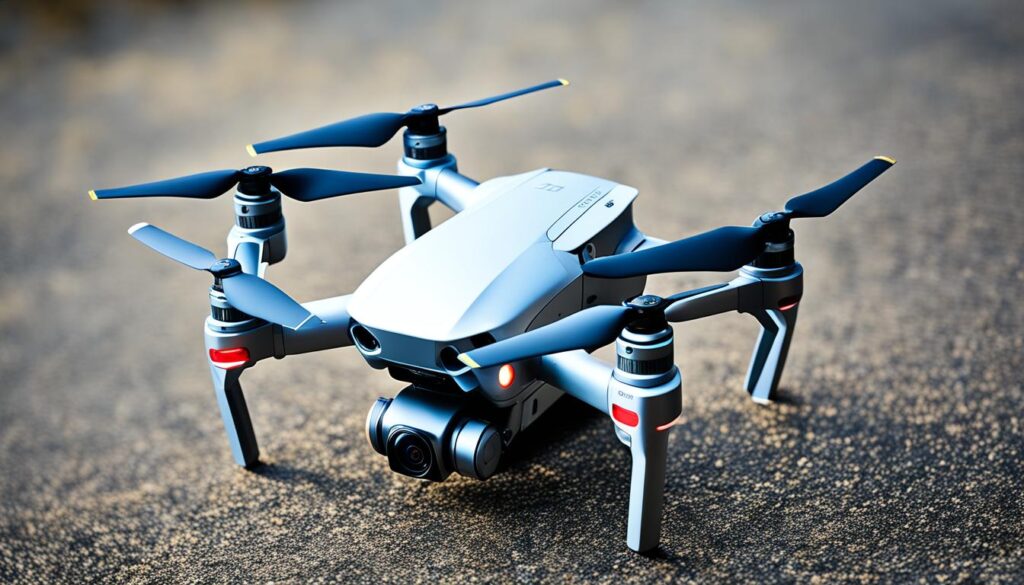
The hallmark of the DJI Mini 3 lies in its lightweight folding design, which not only makes it highly portable but also exempts it from many aviation regulations, thus simplifying the entry process for novice pilots. While some drones compromise quality for size, the Mini 3 maintains a stellar image output, closely rivaling its higher-end counterparts. The omission of collision avoidance and subject tracking is noticeable yet not detrimental for beginners prioritizing mastering the basics over advanced features.
The Experience of Flying DJI Mini 3
New pilots will find the Mini 3’s intuitive drone controls a relieving feature, fostering a gentle learning curve while still allowing for sizable control over the flight experience. The stability and extended battery life contribute to an accommodating and forgiving introduction to drone piloting. Furthermore, pilots can expect negligible drift under normal conditions, ensuring a robust introduction to drone flight dynamics.
- Portability meets flight readiness with quick deployability.
- Image and video capabilities ideal for entry-level filmmaking.
- Battery efficiency allows for prolonged exploration of drone piloting.
- Stable flight performance that builds flying confidence among beginners.
In sum, the DJI Mini 3 positions itself at the vanguard of entry-level drones by striking an exceptional balance between user accessibility and comprehensive performance – all packaged in a nimble and travel-friendly drone.
Ryze Tello: Budget-Friendly Without Cutting Corners
Embarking on the journey of drone piloting doesn’t necessarily demand a hefty investment. The Ryze Tello stands as testament to this, carving out a niche as the best budget beginner drone. It’s no surprise that it’s a favorite among novices, thanks to its lightweight drone for novices design allowing ease of use and transport, without overwhelming the new pilot.
Understanding the Tello’s capabilities, it becomes clear that the drone’s responsive drone controls set a benchmark for affordability meeting functionality. This dynamic is crucial for those first nerve-wracking flights, where responsive controls translate into confidence and swift learning. Here’s a glimpse into what makes Tello a worthy companion for any beginner:
- Intuitive flight operations
- Built-in features aiding stability and safety
- Quality construction with durable materials
Where the Tello truly impresses is in the seamless integration of features designed to bolster the flying experience. From rotor guards that shield against accidental bumps to stability sensors that ensure even a novice’s hands can guide it with assurance, these features enhance usability tremendously.
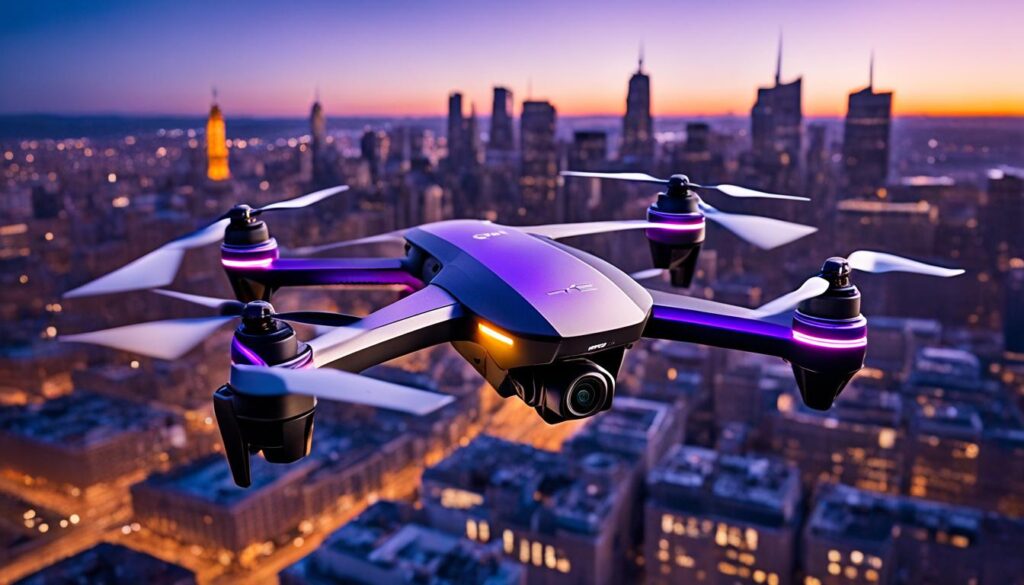
When weighing in on the Tello’s proposition, it’s not just the accessible price point that is compelling. It’s the drone’s undeniable value—a product that nurtures a new pilot’s skills while also crafting a delightful flying experience. Without being overly complex, the Tello introduces the joys of drone piloting in a form that’s as educational as it is entertaining.
For beginners seeking to dive into the world of drones, with minimal risk and maximum fun, Ryze’s Tello offers a balanced platform that fosters growth in piloting skills and aerial creativity.
Flyers can explore, learn, and evolve with Tello, which consistently proves that a forgiving drone doesn’t need to forsake quality or experience in favor of a friendly price tag. It’s the harmonious blend of ease and affordability that makes Tello a must-consider option for any aspiring drone enthusiast.
Autel Evo Nano+: Best DJI Alternative for Beginners
Drone enthusiasts who are just starting out often find themselves looking for an impressive beginner drone that balances ease of use with advanced features. While DJI has long dominated the consumer drone market, there increasingly are viable alternatives that cater to novices. Among them, the Autel Evo Nano+ stands out, presenting a cogent mix of user-friendliness and sophisticated capabilities.
Comparing Autel Evo Nano+ With DJI Models
The Autel Evo Nano+ stacks up noteworthy competition against renowned DJI models by boasting an impressive sensor size that rivals the industry standards set by DJI. This is a pertinent factor for beginners who are aspiring aerial photographers, as sensor size directly influences photo quality. Where the Autel Evo Nano+ further shines is in its collision detection drone technology, a valuable asset for any beginner aiming to keep their drone safe while maneuvering it through the learning curve.
When evaluating the best beginner DJI alternative, battery life is another critical consideration. The Evo Nano+ offers a robust battery, affording ample air time for novices to practice and capture breathtaking shots without the frequent need to recharge. In contrast to some DJI models, flyers of the Evo Nano+ will appreciate the lack of a geofence barrier, granting them the freedom to fly in more areas straight from the get-go.
Understanding the Autel Evo Nano+ User Experience
New drone enthusiasts will find the Autel Evo Nano+ to be an impressive beginner drone not only due to its advanced flight features but also because of its intuitive flying experience. With automated shooting modes akin to those found in high-end models, the Evo Nano+ simplifies the complex aspects of aerial photography, allowing beginners to achieve professional-looking results.
The user experience is elevated by an inclusive suite of safety features, which build confidence among new pilots as they learn the ropes of drone operation. The journey into the world of drones is often fraught with intimidation, but the Evo Nano+ diminishes those barriers, empowering novices with both the technology and the user-centric design needed to start off strong in aerial exploration.
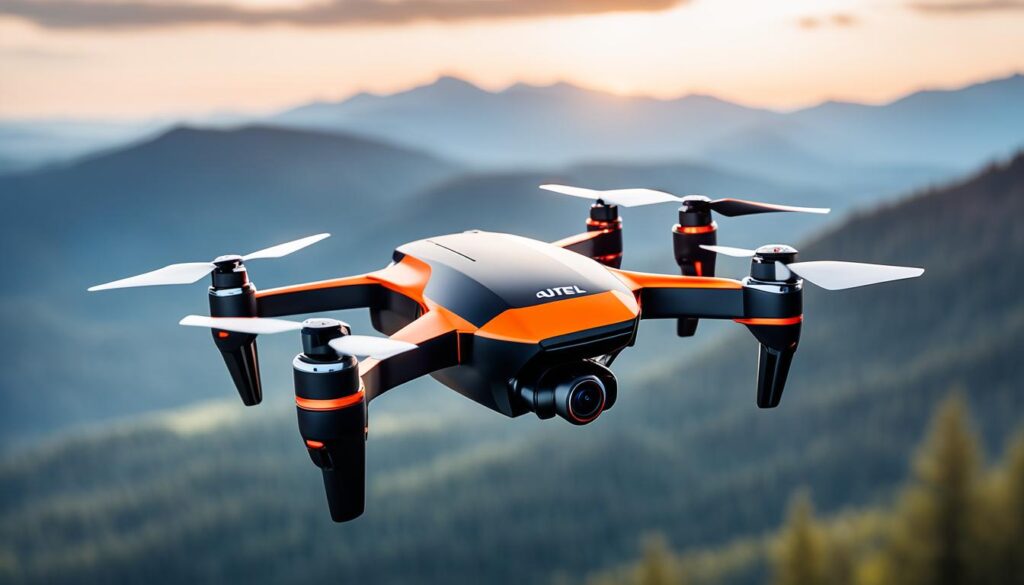
Exploring the Thrills of FPV Drones for Starters
For those who dream of soaring through the skies while rooted to the ground, FPV (First Person View) drones present an immersive flying experience that is second to none. Touted as the best beginner FPV drone, the BetaFPV Cetus X empowers novices with a complete kit designed to ease the transition into FPV piloting. This form of drone flying amplifies the excitement by offering a real-time view from the drone’s perspective through FPV goggles, delivering a captivating flight experience directly to your eyes.
Embarking on this visually stunning journey requires some mastery, as FPV drones demand greater skill and precision. Despite this, they are structured to bolster a beginner’s confidence with each flight, charting a course from simple hovering to acrobatic maneuvers. With the thrill of a first-person experience, pilots can capture dynamic scenes that traditional drone flights might not offer, crafting footage that truly stands out.
| FPV Drone Feature | Benefit for Beginners |
|---|---|
| RTF (Ready-To-Fly) Kit | Eliminates setup complexity, allowing immediate flight |
| Integrated Flight Simulator | Practicing without risk and mastering controls before actual flight |
| Durable Design | Resilience against crashes to withstand the learning curve |
| Simplified Controls | Intuitive learning of nuanced flight maneuvers with less overwhelm |
| FPV Goggles | Direct visual feed for an engaging and interactive flight experience |
For beginners thirsty for a taste of pilotage from the drone’s vantage point, engaging with FPV drones is a step towards a more thrilling aerial adventure. While the lift-off into FPV may appear daunting, the BetaFPV Cetus X and similar models offer the necessary support to build expertise gradually. Equipped with such a device, pilots can look forward to an exciting and immersive venture into the world of drones.
Choosing Between Portability and Performance
For the drone enthusiast starting their journey, the concise selection of a suitable drone can be a pivotal decision. Modern drone technology has advanced to a level where the consumer is often found at a crossroads – portability in drones versus their performance capabilities.
Analyzing the Trade-offs of Compact Drones
Compact drone designs are not just a trend; they’re a response to the drone pilot’s lifestyle. The attractiveness lies in their ease of transportation, seamless integration into travel gear, and the ability to take flight without cumbersome setup processes. However, the trade-offs can be significant. Reduced size often leads to lighter materials and smaller batteries, which may affect flight time and stability.
How Weight Impacts Drone Functionality
When we talk about drone weight considerations, we speak to a foundational element of aerial dynamics. A lighter drone will have its advantages in terms of portability but may struggle against nature’s unpredictability like gusty winds. On the flip side, a heavier drone may not be as affected by such conditions, offering more controlled and longer flights.
| Drone Model | Weight | Flight Time | Wind Resistance | Portability |
|---|---|---|---|---|
| DJI Mini 2 | 249g | 31 min | Moderate | High |
| Mavic Air 2 | 570g | 34 min | High | Moderate |
| Mavic 2 Pro | 907g | 31 min | Very High | Low |
In conclusion, beginners must weigh these factors extensively. While there is no one-size-fits-all approach to selecting the right drone, understanding these key attributes will pave the way for an informed and rewarding flying experience.
Maximizing Your Flight: Tips on Prolonging Drone Battery Life
As drones continue to soar in popularity for both recreational and commercial purposes, adept management of battery life emerges as a vital skill for pilots. Mastering the art of prolonging drone battery life not only enhances your flying sessions but also safeguards your investment in the long run. Key to this mastery are comprehending your drone’s battery specifications and employing consistent maintenance practices tailored to your drone’s unique requirements.
Understanding Battery Specifications and Flight Time
Drone batteries vary widely in terms of capacity, voltage, and composition, factors that directly influence your drone’s flight time. A battery’s milliampere-hour (mAh) rating indicates the amount of power it can hold, while voltage affects the power output. Most consumer drones utilize Lithium-Polymer (LiPo) batteries, known for their high energy density and lightweight properties. Parsing these specs before flight is crucial to estimating your drone’s air time and managing expectations accordingly.
Maintenance Tips to Keep Your Drone Airborne Longer
Regular and attentive maintenance forms the cornerstone of prolonging drone battery life. To maximize each flight, adhere to the following drone flying maintenance tips:
- Ensure batteries are fully charged before flying, but avoid overcharging as it can degrade battery health.
- Store batteries in a cool, dry place and at an optimal storage voltage when not in use to prevent capacity loss.
- Avoid flying your drone in extreme temperatures; intense cold or heat can dramatically reduce flight time and harm battery longevity.
- Monitor battery health using your drone’s application; modern drones provide diagnostics that are helpful in maintaining battery life.
- Implement a soft start to your flight, avoiding aggressive maneuvers until the battery warms up, can help prevent voltage drops.
- Land your drone when the battery level hits 20% to maintain the integrity of the battery’s cells.
Adopting these practices not only conserves battery life but ensures you get the most out of your drone in every journey to the skies. By staying informed and diligent with maintenance, your drone will provide consistent performance, capturing countless aerial vistas without being curtailed by premature power loss.
Drone Safety and Regulations: What You Need to Know
For every drone enthusiast, understanding and adhering to drone safety and regulations is not just a recommendation—it’s a requirement. The Federal Aviation Administration (FAA) sets the FAA rules for drones, which are designed to keep both the skies and the public safe. As a novice pilot, it’s essential to get acquainted with these rules and integrate safety practices for flying drones into every flight plan to ensure not only your safety but also that of others.
Navigating FAA Rules for Entry-Level Drone Enthusiasts
Embarking on your drone journey begins with a clear understanding of the rules laid out by the FAA. The administration has categorized drones by weight and each category comes with specific regulations, especially concerning registration. The first step is identifying where your drone fits within these classifications:
| Drone Weight | Registration Required | Operational Restrictions |
|---|---|---|
| Less than 0.55 lbs (250 g) | No | Fly under the community-based set of safety guidelines. |
| 0.55 lbs (250 g) to less than 55 lbs (25 kg) | Yes | Must have registration number visible; follow Part 107 rules or fly under the Exception for Recreational Flyers. |
| 55 lbs (25 kg) and over | Yes, with additional requirements | Must follow specific operational exemptions and provide proof of FAA registration upon request. |
Remember that failure to register your drone if required can result in regulatory and even legal penalties. Registrations are typically made through the FAA’s DroneZone portal, which is a straightforward process for drone owners.
Integrating Safety Practices Into Your Flying Routine
Once you’ve registered your drone, implementing daily safety practices becomes part of your responsibility. These practices encompass pre-flight checks, flying within visual line-of-sight, and respecting no-fly zones such as near airports or crowded events. It’s recommended you run through the following safety checklist before each flight:
- Check the weather forecast and avoid extreme conditions.
- Inspect your drone for any damage or malfunctions.
- Ensure the battery is fully charged and properly installed.
- Calibrate the drone’s compass and ensure GPS lock.
- Be aware of and respect privacy concerns when flying your drone.
By observing these FAA rules for drones and integrating respectful safety practices, drone piloting can be a thoroughly enjoyable and rewarding experience for beginners and seasoned pilots alike. Always stay informed of changes in regulations and continually seek to enhance your knowledge and skills in drone operation.
Conclusion
The journey into aerial imaging for fresh enthusiasts begins with the pivotal decision of selecting the right UAV. Our guide has methodically traversed through entry-level drone reviews for beginners, unfolding a landscape that’s rich with viable options catering to various needs and preferences. Whether it’s the DJI Mini 3’s standout compact feature set or the Ryze Tello’s emphasis on value, newcomers are presented with devices that align with their growing aspirations as aerial videographers and photographers.
Advantageously, the plethora of choices also includes budget-friendly drones for newbies, ensuring that the pursuit of aerial creativity isn’t hindered by price barriers. Drones like the Autel Evo Nano+ extend the spectrum of affordability, integrating advanced features that challenge even the established frontrunners in the drone community. Ultimately, the perfect selection boils down to the one that resonates most with the individual’s envisioned flight path.
Armed with this wealth of information, beginners can approach the skies with confidence, supported by technology that’s not only perfect budget-friendly UAVs but also champions of user convenience and regulatory compliance. By investing in the right equipment and adhering to the recommended practices for safety and battery care, the new pilot is now well-equipped to take off into the realm of limitless perspectives and awe-inspiring visual stories.
FAQ
What are the best entry-level drones for beginners?
The DJI Mini 3, Ryze Tello, and Autel Evo Nano+ are some of the best entry-level drones for beginners. They offer a balanced mix of user-friendly features, solid camera capabilities, and budget options to cater to novice pilots.
What makes a drone beginner-friendly?
Beginner-friendly drones typically feature easy-to-use controls, stable flight performance, built-in safety features like obstacle avoidance, and automated shooting modes to assist new pilots during their learning curve.
How do I choose my first drone?
When choosing your first drone, consider factors such as battery life, camera resolution, ease of use, and price. Ensure the drone has user-friendly controls and is appropriate for your intended uses, whether that be photography, videography, or simply flying for fun.
Are there drones that offer an immersive flying experience for beginners?
Yes, beginner FPV (First Person View) drones like the BetaFPV Cetus X offer an immersive flying experience with a live feed from the drone’s camera to FPV goggles, designed for beginners looking to dive into first-person flight.
How important are compact designs and portability in beginner drones?
Compact designs and portability are important factors for beginners who value convenience and ease of transport. However, the weight of the drone can impact its stability and performance, so you’ll need to balance these aspects with your flying needs.
What should I know about drone battery life and maintenance?
Understanding your drone’s battery specifications is critical to maximizing flight time. Regular maintenance, following the manufacturer’s charging and storage guidelines, and flying in optimal conditions will help prolong the battery’s performance and lifespan.
What drone safety and regulations should a beginner be aware of?
Beginners should familiarize themselves with local regulations, such as the FAA rules in the United States, which include drone registration requirements. It’s also essential to learn and follow safety practices, such as avoiding no-fly zones and using safety features offered by the drone.
Can beginners find affordable drones that still offer high-quality features?
Absolutely. Drones like the Ryze Tello provide a very cost-effective entry point for beginners without skimping on quality features like responsive controls and a sturdy design, making it an excellent choice for learning the basics without a large investment.
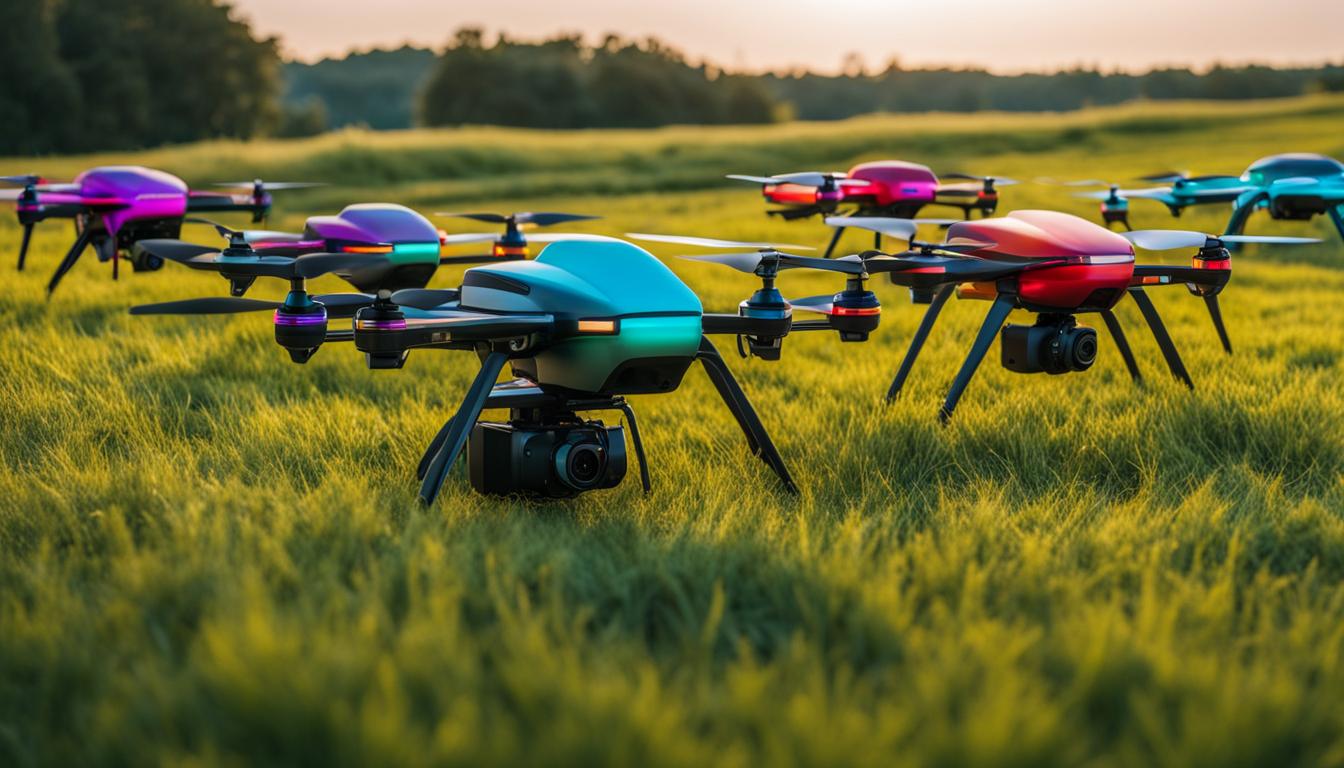
Leave a Reply